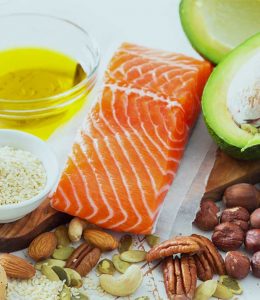Nutritional Benefits
Fumara Salmon and Omega-3
Fumara salmon is a unique product, ideal for a balanced diet and naturally rich in Omega-3. To explain the
beneficial effects of regular salmon consumption, we asked for an authoritative opinion from
Dr Elisabetta Macorsini, nutritional biologist at Humanitas Mater Domini and Humanitas Medical Care at Monza and Arese.
 Fats that are good for you
Fats that are good for you
There are fats that are good for you and they are Omega-3. More and more often we purposefully look for them in food because of the beneficial contribution they make to our health.
Commonly referred to as 'good fats' because of their beneficial properties, they are part of the small group of
essential lipids, so called because the human body is unable to synthesise them and, for this reason,
it is necessary to introduce them by eating foods that contain them in large quantities, such as salmon.
What is Omega-3 good for?
The literature has amply demonstrated the health benefits of Omega-3:
it helps fight ageing, promotes
a healthy cardiovascular system and therefore a healthy heart, regulates cell elasticity and lowers 'bad' cholesterol (LDL). A recent scientific publication* sheds new light on the interesting relationship between cardiovascular disease and Omega-3 fatty acids. The review took into account several clinical studies, demonstrating that Omega-3 consumption is often associated with positive effects on heart function.
*De Caterina. "n-3 FattyAcids in CardiovascularDisease". The New England Journal of Medicine 2011;364:2439-2450
Omega-3 fatty acids are very important for those with high cholesterol levels, because:
- They prevent cholesterol and triglycerides from building up on arterial walls.
- They counteract the hardening of blood vessels.
- They make the blood more fluid so that it can circulate better.
They also help to
lower high blood pressure and play an important role in the nervous system. A correct daily intake of Omega-3 can have important effects on
maintaining normal cognitive functions and
preventing degenerative neurological diseases in the elderly (
numerous studies have shown that DHA is essential for the formation of brain cells).
But in order to meet your Omega-3 requirements, it is important to rely on your diet in the first place.
Omega-3 in salmon: a true ally
Whereas in the past only the total amount was important, more recently the focus has been on the
distribution of Omega-3 in the diet, with a classification between:
- Plant Omega-3 (ALA)
- Animal Omega-3 (EPA and DHA)
The Omega-3 contained in plants (ALA) must first be converted back to DHA and EPA before it can be assimilated by our bodies. This conversion does not always take place.
This is why it is advisable to eat more fish.


Rich in protein, fatty acids and micronutrients such as phosphorus, selenium and vitamins B6, B12 and niacin,
Fumara salmon is naturally rich in Omega-3 fatty acids that can help maintain healthy bones, teeth and skin. It can also contribute to bone marrow formation, red blood cells and stimulate brain function.
The American Heart Association recommends at least two portions of fish per week (including salmon) and two portions of vegetables or oils containing ALA (
flaxseed and linseed oil, oat germ, green leafy vegetables, some legumes such as soya, beans, lentils).
| OMEGA-3 IN 100 g OF SALMON FUMARA: |
|
| SMOKED NORWEGIAN SALMON |
0,7 g |
| SMOKED SCOTTISH SALMON |
0,6 g |
| BIO SMOKED NORWEGIAN SALMON |
1,0 g |
| WILD SOCKEYE SMOKED SALMON |
0,3 g |
| NATURAL NORWEGIAN SALMON |
0,6 g |
| NATURAL SOCKEYE WILD SALMON |
0,3 g |

 Fats that are good for you
Fats that are good for you